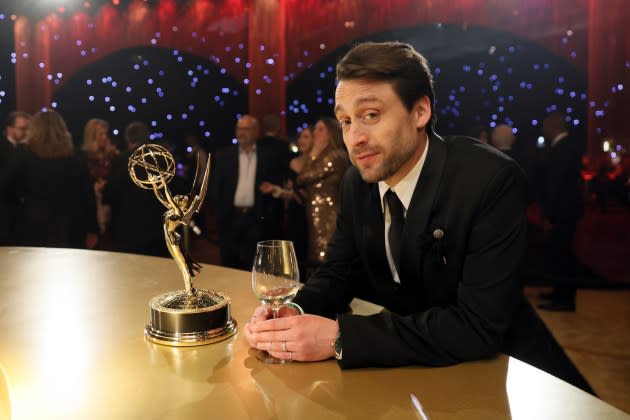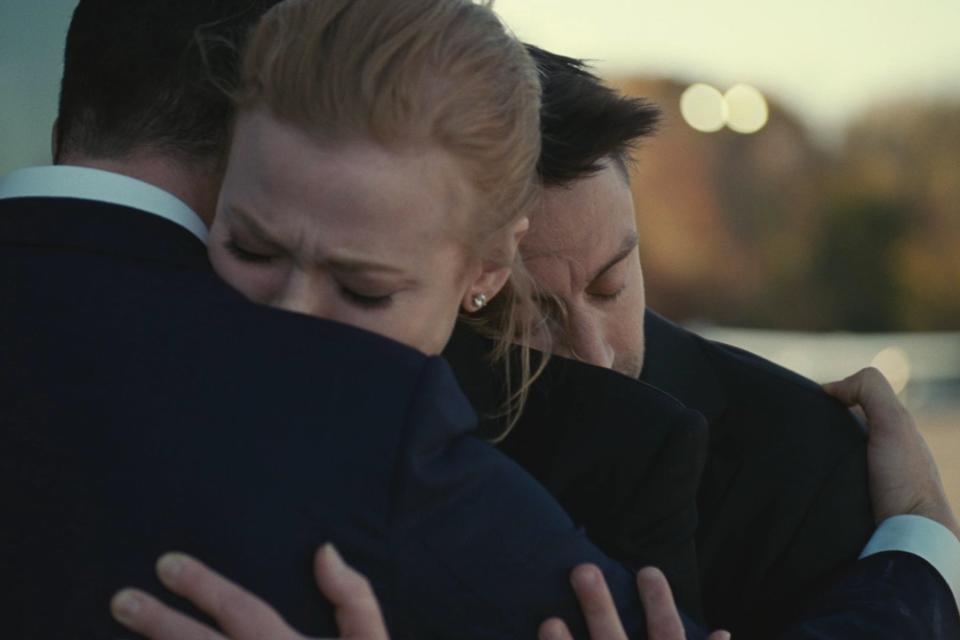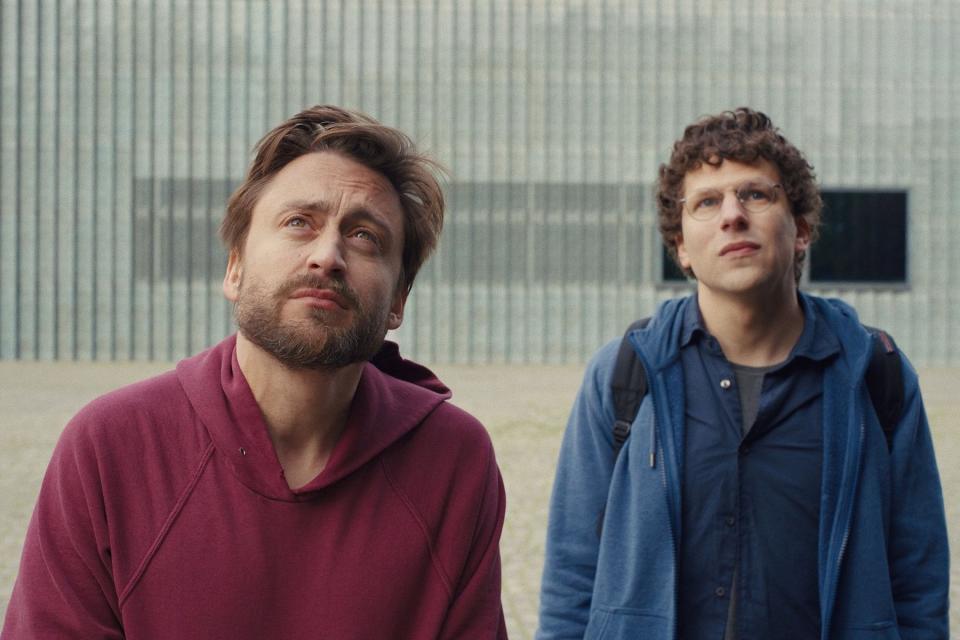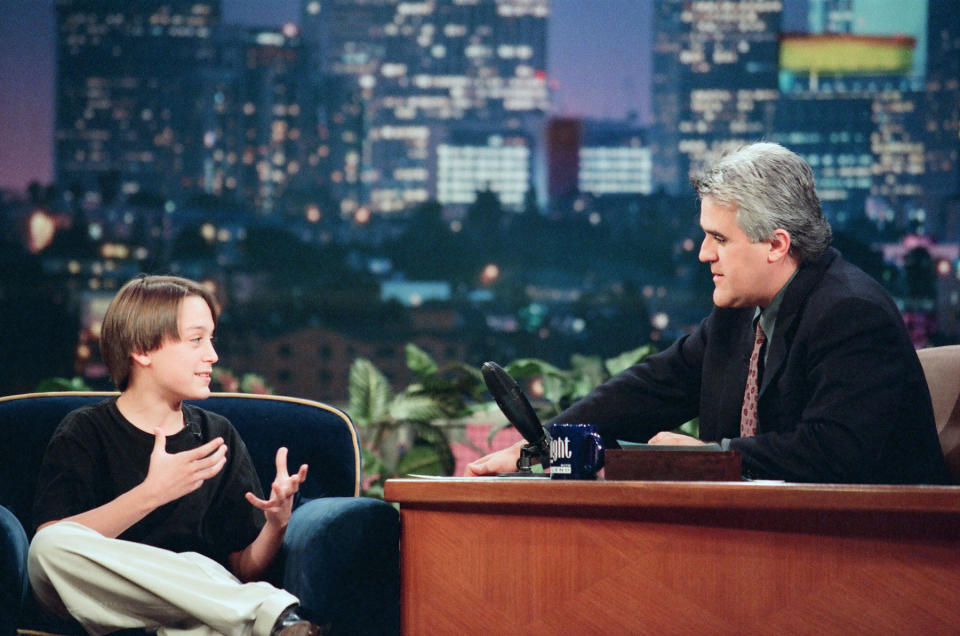Kieran Culkin on Life After ‘Succession’ and Learning to Love Acting
- Oops!Something went wrong.Please try again later.
- Oops!Something went wrong.Please try again later.
- Oops!Something went wrong.Please try again later.
- Oops!Something went wrong.Please try again later.
- Oops!Something went wrong.Please try again later.
- Oops!Something went wrong.Please try again later.

Kieran Culkin looks as though someone’s stolen a piece of his soul. We’re seated across from one another in the bustling lobby of the Pendry, a tony hotel in Park City, Utah, and the Succession star has just clocked a middle-aged man not-so-surreptitiously snapping several photos of him from across the room. He shifts uncomfortably in his seat and takes a sip of his pilsner before leaning over to me.
“I’m feeling very… exposed,” he says, his voice a hair above a whisper. “And if you ask them, ‘Hey, did you just take my picture?’ They’ll go, ‘No, of course not!’ and make it seem like I’m an asshole for even asking, like, ‘No, you conceited prick!’”
More from Rolling Stone
'As We Speak' Exposes the Racism Behind Criminalizing Rap Lyrics
'Devo' Documentary at Sundance Is Perfect Tribute to the Iconic Band
The 41-year-old actor still isn’t entirely comfortable with fame — though in the social media age, who is? — but he’s come a long way since receding from the limelight following the success of 2002’s Igby Goes Down. He’s learned to take the bad with the good, and, more importantly, enjoy some of the trappings of success, which of late have included Emmy and Golden Globe wins for his crackling portrayal of Roman Roy on Succession.
It’s been about ten months since Culkin wrapped the fourth and final season of Succession, and we’re in the snowy mountains of Utah for the 2024 Sundance Film Festival, where his new film A Real Pain is making its world premiere. Written and directed by Jesse Eisenberg, the film follows David (Eisenberg) and Benji (Culkin), two quarreling cousins who, following the death of their beloved grandmother, travel to Poland to visit the Majdanek concentration camp and learn about her past.
As for his own, well, Culkin is grateful to have finally found his calling.
I last interviewed you ten years ago for This Is Our Youth. We polished off an entire bottle of Lagavulin in your dressing room.
I remember it! We went through quite a bit of it. Eventually, I had so many empty bottles of Lagavulin that there was this high shelf of it going around the room. Here’s the thing with Scotch: People who are Scotch enthusiasts come up to me and start talking about how they’re made with the barrels and shit, and I’m like, I’ll pour it in a glass and I’ll drink it if it’s good.
Is Scotch still your go-to?
This whole interview’s gonna be about Scotch. [Laughs] I’ve had to accept in the last few years that I don’t have the same love for Scotch as I used to. Something switched in my body chemistry. I still like booze. I drink everything, but right now I like vodka martinis — very dry, very cold, and a little bit dirty — and I like champagne. Weirdly, those are the only two things I want to drink.
I wanted to ask you about the bracelets on your wrist. Do you collect them? And do they hold sentimental value?
It’s usually not that interesting. Some of them I take. Some of them people give me. Some of them I buy. Two of these have the names of my kids.
The bracelets with names spelled out has become a Taylor Swift thing.
See, I don’t even get the reference. People keep saying, “Oh, Taylor Swift…” and I’m like, “I don’t even know what that means. I’ve been wearing tons of bracelets for, like, twenty years.” They’re supposed to mean something?
Her fans exchange friendship bracelets with their names or other messages in letters at her concerts.
OK. I don’t know. I’ve never been to a Taylor Swift concert.
How are you taking all the adulation? Something in you must have shifted a little bit where the limelight doesn’t get to you like it did around the time of Igby Goes Down.
Well, that’s the whole goal, is to not let it affect you. You take the nice moments when you can and… I don’t know. Anything else, you let it be. There’s a part of me that tells myself I shouldn’t enjoy it. I just always feel like there’s a lot of shame involved with what it is that I do and any sort of success comes with this shame and this apologetic nature where I’ll have to be like, “I’m sorry if someone came up and said something nice. I didn’t mean for that to ruin our evening.” This time around I’ll have that instinct, but I’ll go, No, it’s OK. You can enjoy this moment right now.
And Succession is truly something to be proud of. A landmark work.
There was so much hard work that was put into it by everybody — particularly the last two seasons. I’m embarrassed about this and probably shouldn’t say it, but I used to have this thing where I would be at these award show afterparties and I would see the winners carrying around their awards and I would be like, That’s a bit much. Don’t you think you should leave it in the car? And that was my instinct when I had it. And then I thought, You know what? I think I can have this moment because it’s just this one night. If go to tomorrow’s party carrying it I’m a dickhead, and if I start carrying it around everywhere I go then I’m a dick, but that’s OK, I’m gonna bring it into the party. And when I say that — I made my wife carry it around the entire night. That brought me so much joy because the Golden Globe is extraordinarily heavy and I’d be like, “Hold this — I gotta go shake someone’s hand,” and she’d be like, “Come on!”

From Igby Goes Down to Succession to A Real Pain, you seem to do so well playing in the pond of familial dysfunction.
My mom used to always say that. She’d go, “How come whenever there’s a movie about a dysfunctional family they always reach out to us?” I don’t know. I’ve never been able to figure out why I’m drawn to something. I could tell you very specifically why I don’t want to do something, but this I just read and felt like I understood it right away. I also don’t like to analyze it. I had that with Succession and with this movie. It’s very rare that I read it and go, Oh, I actually get every moment. I know who this guy is. I don’t want to read anymore. The fastest I ever had it was with Scott Pilgrim vs. the World. I read the character description and it said: “Wallace Wells, 26. Scott’s gay roommate. Disloyal. Arched eyebrow.” And I was like, I know who this guy is and I want to play him.
How did Jesse Eisenberg cast you in A Real Pain?
He told me that he hadn’t seen Succession and that I got the part because his sister read the first thirty pages that he wrote and said, “Oh, here’s who you should cast.” He said he then did the minimal research of looking me up and said, “OK.” I was like, that’s a huge leap of trust! There was no audition process or anything.
Had you visited Majdanek or any of the Nazi concentration camps before this?
Never before, but we did in the film. I really appreciated the way he put it in because it would have been really difficult to do what I’d call “scene work” in a concentration camp. And we didn’t do that. Even the way it was written into the script was, “They walk into this room. They walk into this room. They walk across the field and they see this.” It was very minimal dialogue and only the tour guide talking. These characters were taking it in and we were, too.
From what I’ve read, it seems like you and Jesse had a healthy dose of friction when it came to your respective processes.
Only a bit in the beginning. I used to have a very specific way that I worked. And then I started doing Succession and the way that they worked, I could not have survived if I tried to use my process. We had writers coming in with last-minute drafts and changes being made in the moment — “Hey, we were gonna shoot it in this room, but now we’re going to go outside.” Our backs were against the wall and we had very few tries at it, so you had to be very alive and in the moment, which was very different from me being off-book for weeks. It was this new, structureless way of working that I now think is the best way to work to where I was thinking, On my next job, I’m fucked. One of the first days [on A Real Pain], I saw the call sheet and we were shooting this one three-page scene all day that on Succession we’d bang out in two to three hours — do the scene four or five times in full and we’re done. We were there for fuckin’ eleven or twelve hours and did it about forty times. But then we both adapted to each other’s styles.

A Real Pain is also produced by Emma Stone, who’s an ex of yours.
It’s funny to even say “ex.” To me, she’s just a really good friend of mine and my wife’s. She’s lovely and great.
Both of your careers have really taken off since then.
I met her when the rocket took off. I was right at the beginning of the huge launch; I got to watch all that firsthand. And I remember at the time that I was a little more aware of the direction she was going than she was. She would be like, “Oh my god! I just got this opportunity…” And I’d be like, “Yeah, but of course you did! Everyone loves you and you’re great.” I remember her letting out a blood-curdling scream on the phone and I came running over thinking somebody had died, and she’s weeping, and I’m rubbing her back thinking I have to get a Scotch ready for her or something, and she was like, “I’ve just been asked to host SNL!” And I gave her the biggest fuckin’ hug. It was so great to be a part of that moment because that was her life goal, to host SNL, and she achieved it at 21. She didn’t think she was in that field and I was like, “Of course you are!”
I spoke with Freddie Prinze Jr. some years back and he said something about you that stuck with me. He said, “Kieran’s a really great guy, and the only actor who’s more willing to turn his back on this industry than I am.”
[Laughs] He’s a great guy, too. Yeah. We’re both sort of that way. It’s continuing to do it while avoiding doing what you’re doing but also sort of doing a soft pursuit. And I say “soft pursuit” because when something comes in that I like I tend to panic because I was looking forward to not working and trying to stay away. I’m always afraid of the next job that’s coming.
This is admittedly a silly question, but I really want to ask it: What goes through your mind when you hear Brian Cox narrating the McDonald’s commercials and humming the jingle?
Oh, I love it! I heard it and right away went, “Oh, that’s Brian! Good for him. He’s making some money.” Brian loves money. He does.
At the Emmys afterparty, the moment, to me, that was the end of the show was Sarah Snook leaving the party… After she left, I wept. I was inconsolable for the longest time at that party. People kept bringing me tissues.
Now he’s promoting a video game: Tekken 8.
I just heard that. It’s funny. When me and my wife had been dating for about a week, she came over to my place and saw all the video games I had. I was like, “Is this a lot? Is this overwhelming?” And she was like, “That is a lot.” I said, “Did you ever play games?” She said, “I had a PlayStation for a couple of years when I was young and the one game I had was Tekken.” I said, “Oh yeah? I’ve never actually played Tekken.” And she goes, “I’ll whoop your ass in Tekken.” She went to work, and I went out and bought Tekken. She got back from work, and I proceeded to whoop her ass for about half an hour in Tekken having never played that game. She couldn’t even come close. I picked this character, Yoshimitsu, who was in Soul Calibur.
Hell yeah. I had Soul Calibur on Dreamcast. Do you still game now?
I have two kids so there’s almost no time. Before that, I was mostly a retro gamer. Most of my stuff was Nintendo, Super Nintendo, and N64.
This is a big chapter that’s closing with the end of Succession.
It is. At the Emmys afterparty, the moment, to me, that was the end of the show was Sarah Snook leaving the party. There’s a SAG Awards coming up in a month and that’s the last one, and she’s not going to be able to make it. We already know that Sarah, Brian, and Jeremy are not making it, and it’s an actors’ awards so the writers won’t be there. A few of us will be there, but it’s a petering out. So, after she left, I wept. I was inconsolable for the longest time at that party. People kept bringing me tissues.
I believe the funeral episode of Succession is some of the best acting you’ve done. It reminded me of that sequence in Magnolia where Tom Cruise is breaking down next to his dying father who’d abandoned him. Cruise had a very strained relationship with his own father, which it felt like he was channeling in that scene. I’m curious if you brought anything from your own strained relationship with your father into the funeral scene.
That thought didn’t even cross my mind with my own father; because to me, there’s no weight there to the stuff with my father. I wouldn’t purposely draw from that because there’s nothing in that well. But it’s also not my style to tap into the reality of my personal life. The thing that I’ve learned to do on the show is to trust it, don’t think about it, don’t rehearse it, and do it. I knew it was coming and the night before I thought, Maybe I should prepare. I looked at the dialogue, read it, and remember doing about five seconds of it before going, I can’t do it. I have to go out there and just do it. Otherwise, I’d be up all night torturing myself over it and that wouldn’t help.
The way that [Mark] Mylod decided to do it is, we get into the church and it’s full. Background actors are filling the pews. Three or four cameras. He gets up at the podium and explains that we’re going to run a real funeral procession without stopping. We did not rehearse it. We did not discuss it. But from action, we saw the casket come out of a car outside. We saw it brought up the stairs. Everyone stands up; we stood behind. The music plays, and I remember that being kind of tough, like, OK, there’s this casket and dad’s in there. Alan [Ruck] got up, and for the very first time we saw him give his speech. Then James Cromwell goes up and gives this amazing fucking speech that really hit me. And now I have to go up and do my thing which I’ve not rehearsed. From what I can remember, and from what I’ve seen from that episode, it seems like everything is from my first take because I couldn’t get there again. I was a wreck.
I wanted to ask you about The New Yorker profile of Jeremy Strong. What did you think about that piece and how it portrayed his process?
That’s a hard one for me to talk about, especially in a print thing. A lot of what I say can be taken out of context because I think people try to create a feud that honestly isn’t there. He works differently than a lot of people I work with, but then again so does Brian Cox, and so does Matthew Macfadyen. I’ll take a moment to praise him because I’ve always said, “If I’m ever a producer, Matthew is my dream actor.” This guy shows up on time prepared, never has a problem, understands the material fully, never has a question, does his work, and goes home. He doesn’t even go to the parties or dinners afterward. He’s there to work. He’s probably the most talented actor I’ve ever worked with. And he’s also the most lovely man. His nickname on set was “Perfect” because he’d always hang up his clothes at the end of the day neatly for wardrobe and the clothes would come back smelling better than they did at the start of the day. He’d never played softball in his life and then in the first episode he steps up to the plate and hits the fucker all the way across the field. He’s that guy. But people just work differently.

What did you learn from seeing your older brother Macaulay walk through the flames before you?
What happened to him as a little kid was very unpleasant. It’s hard to reconcile anything when you’re nine years old, let alone this kind of attention and fame.
You had a period after Igby Goes Down where you took a hiatus from the industry. Was there a particular project or projects that reignited your passion for acting?
I’ve had three acting jobs that have affected me pretty profoundly in my life. Igby was the first one. That was the first time I was treated like an actor where I started developing a process of understanding what scene work was and character development. That just changed my whole perspective. But then, yeah, I ran away from the business for a while. I still worked and did things I really loved. The next one was This Is Our Youth. I’d been pursuing it for eight years and it took a lot to convince Kenny Lonergan to let me play that part because he really didn’t see me in that part. But I found a way in that made sense to me. And my first and only Broadway production was in my dream play with one of my best friends [Michael Cera] and my good friend Kenny who wrote it. That was the dream. And since then, I’ve felt like I could retire.
After Igby, I felt, OK, I don’t think this acting thing is for me, but I don’t know what else to do and I’ll try to find it. And then I did This Is Our Youth and was like, OK, this is the perfect job and I’ve peaked, and now I really need to find what else to do, and I still don’t know if I want to be an actor. Then I started doing Succession and it was Season Two, and I had the thought of: I want to be an actor. I know what I want to do with my life, and it’s the thing I’ve been doing for three decades. It took me that long to realize this is the thing that I want to do.
Best of Rolling Stone

